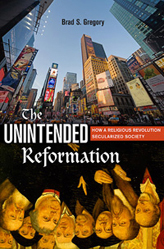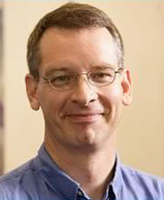
How did our world come to be as it is? Examining why and how the West was propelled into its current pluralism and polarization over the long term, The Unintended Reformation: How a Religious Revolution Secularized Society (Harvard University Press, 2012), offers new insight into how life in North America and Europe has been shaped over the past five centuries by the Protestant Reformation.
Author Brad Gregory, University of Notre Dame historian, traces the relationships among religion, science, politics, morality, capitalism and consumerism, and higher education from the Middle Ages through the Reformation era to the present.
“Because 16th- and 17th-century Christians could not agree about what was true, right, and good, modern individuals were eventually permitted to determine these things for themselves,” Gregory says.
“And as long as most people still continued to agree about basic moral views and political assumptions, despite their religious differences, such politically protected individual freedoms could contribute positively to the robust functioning of a democratic society.”
However, Gregory argues, fundamental disagreements about how we should live and the lack of a shared view of the common good—which is due, in part, to the proliferation of divergent secular and religious views—today tends to cause friction and faction when those freedoms are exercised.
“Basic modern institutions and arrangements solved the problems of religious coexistence inherited from early modern Europe, but they also have created the conditions for the proliferation of intractable societal disagreements that increasingly seem to frustrate the healthy functioning of a democratic political process,” Gregory says.

Prior to the Protestant Reformation, Western Christianity was an institutionalized worldview with expectations of security for earthly societies and hopes of eternal salvation for individuals. The Reformation sought to advance this vision, but unresolved doctrinal disagreements and religiopolitical conflicts prompted changes in the religious fabric that bound societies together. Virtually all domains of human life were affected.
“One of the book’s arguments is that disciplinary specialization and the fragmentation of knowledge prevent us from seeing important connections among phenomena ordinarily studied separately,” Gregory says.
“The tendency of many historians to concentrate on different types of history—intellectual, social, economic, and political—to the exclusion of others diminishes our comprehension of the past. All these types of history must be incorporated because of their combined explanatory power, a corollary of their interrelated historical influence. I have sought to show this in my book.”
Learn More>
- Brad Gregory faculty page
- Department of History
- The Unintended Reformation: How a Religious Revolution Secularized Society
Originally published at newsinfo.nd.edu.